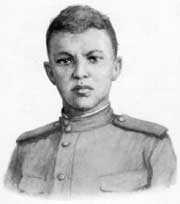Alexander Matrosov
| Alexander Matrosov | |
|---|---|
 | |
| Born |
5 February 1924 Yekaterinoslav (now Dnipropetrovsk), USSR |
| Died |
27 February 1943 (aged 19) Chernushki, Loknyansky District, Pskov Oblast, USSR |
| Allegiance |
|
| Rank | Private |
| Awards |
|
Alexander Matveyevich Matrosov (Russian: Алекса́ндр Матве́евич Матро́сов; Ukrainian: Олександр Матвійович Матросов) (February 5, 1924 – February 22 or 27, 1943), born in Yekaterinoslav (now Dnipropetrovsk) was a Soviet infantry soldier during Great Patriotic War, awarded the title of the Hero of the Soviet Union for blocking German pillbox with his chest.
Official Soviet version
According to Soviet sources, on 22 February 1943, in the battle for the village of Chernushki, currently in Loknyansky District, Pskov Oblast, Matrosov threw himself onto a German pillvox, blocking the machine-gun with his own chest, to allow his unit to advance. For his self-sacrifice in battle, Matrosov was posthumously awarded the distinction Hero of the Soviet Union.[1]
Alternative versions
In post-Soviet times, a number of alternative versions were published, some of which suggested the event was inadvertent. [2][3][4]
M. J. Broekmeyer claims that Matrosov had been dragged in front of the post by the Germans when he tried to push down the barrel of the gun after having crawled up above the firing hole, and that his death was moved from February 27 to 22 to match the day of the creation of the Red Army.[5]
Similar cases
There were a large number similar cases during the Great Patriotic War, many of them happened before Matrosov.
According to Chinese propaganda, Matrosov's tale also inspired Huang Jiguang, a famous Chinese revolutionary martyr, to perform similar feat during the Korean War.[6]
In popular culture
Matrosov is the main character of the 1947 war film, Private Alexander Matrosov (Рядовой Александр Матросов), directed by Leonid Lukov.
References
- ↑ Biography (Russian)
- ↑ "«Александр Матросов. Правда о подвиге» — Россия, 2008". Archived from the original on 2012-02-11.
- ↑ Лазарь Ильич Лазарев (2001-05-07). "Когда мы вернулись с войны". Новая газета. Archived from the original on 2012-02-11. Retrieved 2010-05-14.
- ↑ Юрий Прохоров, "Правда о великой победе под Курском", Мегаполис, 2003, No 33
- ↑ M. J. Broekmeyer, Stalin, the Russians, and Their War: 1941-1945, University of Wisconsin Press, 2004, ISBN 0-299-19594-5, Google Print, p.206
- ↑ Matrosov Style Hero, Hung Jiguang (马特洛索夫式的英雄黄继光), Beijing: People's Daily, 1952-12-21, retrieved 2012-11-26
External links
- Image
- A monument to Alexander Matrosov, Moskovsky park of Victory, St. Petersburg
|